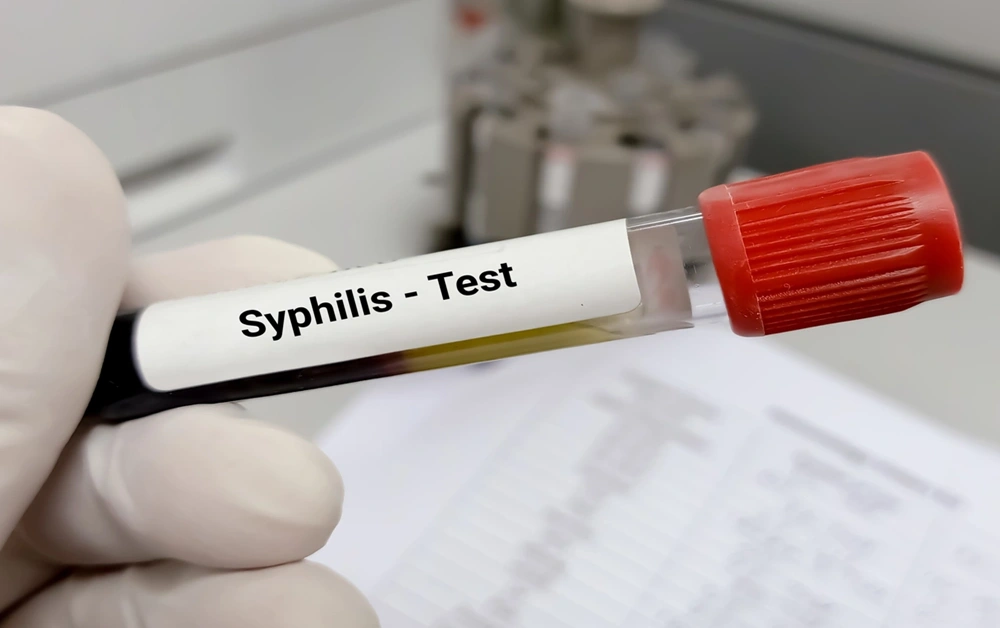Being syphilis’ most enigmatic phase, a lot of people can overlook this stage, leaving many unaware of the silent infection within their system.
Here’s what you need to know about it.
Latent syphilis
Latent syphilis represents a phase in the progression of the syphilis infection that’s notable for its lack of overt symptoms.
This stage follows the initial appearance of symptoms, which can include sores and rashes, and can be divided into early and late phases, with the early latent period being within the first year of infection. During this time, the disease is still active in your body but becomes silent, making it less detectable without specific blood tests.
The significance of identifying and treating latent syphilis lies in its potential to prevent the advancement to tertiary syphilis, which can be serious and life-threatening.
Understanding latent syphilis is crucial not only for those who are infected, but it’s also helpful for preventing the spread of the infection to others.
How is latent syphilis diagnosed?
Though you may not exhibit or feel syphilis symptoms, there are still ways to diagnose syphilis at its latent stage. To do so, your healthcare provider will conduct a series of tests to detect antibodies produced in response to the causative agent of syphilis.
Your healthcare provider may order a series of blood tests, including rapid plasma reagin (RPR) and venereal disease research laboratory (VDRL).
They will also do a thorough review of your:
- Medical history
- Past symptoms
- Sexual history
At home, you can easily take a quick antibody test and learn if you have syphilis.
What causes latent syphilis?
Similar to the other stages of syphilis, latent syphilis is caused by the bacterium Treponema pallidum.
After the initial infection, this bacterium can remain in your body without causing visible symptoms until it reaches the latent stage. This stage signifies that the bacterium is present and can still affect health, even though it does not manifest through symptoms typically associated with the earlier stages of the infection.
What are the stages of syphilis?
Here are the four stages of syphilis.
Primary syphilis
At the first stage of syphilis, you may notice a sore at the infection site. This is the initial warning sign where the Treponema pallidum bacterium first makes its presence known.
Secondary syphilis
At this stage, the symptoms are more pronounced and diverse. You may notice a skin rash and mucous membrane lesions in your body.
Latent syphilis
During this phase, the disease becomes hidden, and symptoms are absent. Since the bacterium lies dormant within your body, the infection is more challenging to detect without specific testing.
Tertiary syphilis
This severe stage involves the heart, brain, and other organs, leading to potentially life-threatening complications if not addressed through appropriate medical intervention.
How can latent syphilis affect health?
While latent syphilis is silent, it can progress to tertiary syphilis and cause severe complications such as neurological disorders and cardiovascular damage.
If you’re pregnant, it can also pose significant risks to you and your child. As your immune system becomes more compromised, your risk of contracting HIV also increases.
How do you treat latent syphilis?
Latent syphilis is treated with antibiotics, specifically penicillin. The treatment approach depends on the duration of the latent infection.
If you’re allergic to penicillin, your healthcare provider may prescribe doxycycline or tetracycline.
Why is early detection and treatment important?
If you get diagnosed with syphilis sooner, you can prevent the progression of the disease to more advanced stages, which can cause life-threatening complications.
Also, timely treatment significantly reduces the risk of transmission to your sexual partners and, during pregnancy, to your unborn child.
Frequently asked questions
What defines latent syphilis?
Latent syphilis refers to a stage where the infection is present in the body without showing any symptoms. This stage follows the primary and secondary stages if untreated.
How is latent syphilis diagnosed?
Diagnosis of latent syphilis typically involves blood tests that detect antibodies to the syphilis bacteria, as direct symptoms are not present during this stage.
Can latent syphilis be transmitted?
Transmission of syphilis in its latent stage is less likely compared to its primary and secondary stages, but pregnant individuals can pass the infection to their unborn child.
What are the potential complications of untreated latent syphilis?
Untreated latent syphilis can progress to tertiary syphilis, leading to severe medical problems affecting the heart, brain, and other organs. Ultimately, this stage can potentially result in death.
How is latent syphilis treated?
Treatment for latent syphilis typically involves the administration of penicillin or other antibiotics, depending on the duration of the infection and individual patient allergies.
Key takeaway
Latent syphilis is a silent yet significant phase in the progression of syphilis. Despite the lack of symptoms, the infection remains active in your body and can lead to severe health complications if left untreated.
Make syphilis screening a regular part of your healthcare routine with a convenient and private at-home antibody test available here.




















































